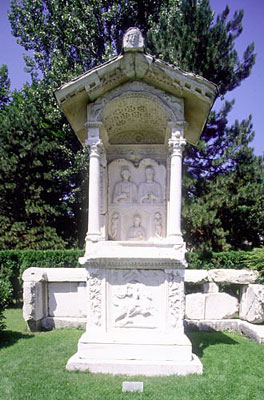The early Slovenes settled in the river valleys of the Danube Basin and the
eastern Alps in the 6th century. In 748, Slovenia was brought under Germanic
rule, first by the Frankish empire of the Carolingians, who converted the
population to Christianity, and then as part of the Holy Roman Empire in the 9th
century. The Austro-German monarchy took over in the early 14th century and
continued to rule (as the Austrian Habsburg Empire from 1804) right up until
1918 - with only one brief interruption. Over these six centuries, the upper
classes became totally Germanised, though the peasantry retained their Slavic (later
Slovenian) identity.
In 1809, in a bid to isolate the Habsburg Empire from the Adriatic, Napoleon
established the so-called Illyrian Provinces (Slovenia, Dalmatia and part of
Croatia), making Ljubljana the capital (which it still is today). Though the
Habsburgs returned in 1814, French reforms in education, law and public
administration endured. The democratic revolution that swept Europe in 1848 also
increased political and national consciousness among the Slovenes, and after WWI
and the dissolution of the Austro-Hungarian Empire, Slovenia was included in the
Kingdom of Serbs, Croats and Slovenes. During WWII much of Slovenia was annexed
by Germany, with Italy and Hungary taking smaller shares. Slovenian partisans fought against the invaders from mountain bases. Slovenia
joined the Socialist Federal Republic of Yugoslavia in 1945 and remained behind
the Iron Curtain for several decades.
Slovenian partisans fought against the invaders from mountain bases. Slovenia
joined the Socialist Federal Republic of Yugoslavia in 1945 and remained behind
the Iron Curtain for several decades.
Slovenes worried when Serbia started to make moves in the late 1980s to
assert its cultural and economic leadership among the Yugoslav republics. In
late 1988, when Belgrade abruptly ended the autonomy of Kosovo, Slovenes feared
that the same could happen to them. Pushing the Slovenes to split from
Yugoslavia was the fact that for some years Slovenia's interests had been
shifting to the capitalist north and west. Meanwhile, its ties to the rest of
Yugoslavia had become an economic burden and a political threat.
In the spring of 1990, Slovenia became the first Yugoslav republic to hold
free elections and slough off 45 years of communist rule; the following December
the electorate voted overwhelmingly (90%) in favour of independence. Fearing the
worst, the Slovenian government began stockpiling weapons and, on 25 June 1991,
it pulled itself out of the Yugoslav Federation. To dramatise its bid for
independence and generate foreign sympathy, Slovenia deliberately provoked
fighting with the Yugoslavian federal army by attempting to take control of its
border crossings. A 10-day war ensued, but resistance from the Slovenian militia
was fierce and, as no territorial claims or minority issues were involved, the
Yugoslav government agreed to a truce brokered by the European Community (EC).
Slovenia got a new constitution right away and, on 15 January 1992, the EC
formally recognised the country. Slovenia was admitted to the United Nations in
May 1992.
In October 2000, in Slovenia's third election since gaining independence, the
Liberal Democratic party was returned to power and Janez Drnovsek was returned
to the prime ministership after being dumped six months earlier when his
coalition lost its majority. Drnovsek is believed to be the person who can
finally wrench open the political doors to the European Union and NATO for
Slovenia.
| 6th century AD |
The Slavic ancestors of present
day Slovenia first settle in the area in the 6th century AD. |
| 7th century |
The Slavic Duchy of Carantania,
the first Slovene state. |
| 745 |
Carantania becomes part of the
Frankish empire; the Slavs convert to Christianity and gradually lose their
independence. |
| around 1000 |
The Freising manuscripts, the first
known writings in the Slovene and Slavic dialect in Latin script. |
| 14th century to 1918 |
All the Slovene regions pass
into the possession of the Habsburgs, later the Austro-Hungarian monarchy. |
| 1550 and 1584 |
The Reformation brings literacy,
the
first printed book in 1550 and in 1584 the
first Slovene translation of the Bible. |
| 1918 |
Formation of the Kingdom of
Serbs, Croats and Slovenes. |
| 1945 |
Federal Peoples' Republic of
Yugoslavia (officially declared on 29 November 1945). |
| April 1990 |
First democratic elections. |
| 23 December 1990 |
88.5% of voters at the
referendum vote in favour of an independent Slovenia. |
| 25 June 1991 |
Slovenia officially declares
its independence. |
| 15 January 1992 |
The EU officially recognises
Slovenia's independence. |
| 22 May 1992 |
Slovenia becomes a member of
the UNO. |
| 1 February 1999 |
Association Agreement with the
EU comes into effect.
UP |